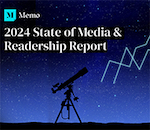 |
| Saud al-Qahtani |
The more than 10,000 accounts that Twitter permanently suspended Sept. 20 include that of former Saudi royal court adviser Saud al-Qahtani, who is suspected of being involved in the October 2018 murder of journalist Jamal Khashoggi. A blog post on Twitter’s website says that al-Qahtani’s account was removed because of “violations of our platform manipulation policies.” In addition, six accounts linked to Saudi Arabia’s state-run media apparatus were suspended, as well as more than 4,000 accounts in the United Arab Emirates and Egypt. Spain, Ecuador and China were also among the countries where accounts were suspended. Twitter says that the suspensions are part of its efforts to “enhance and refine our approach to disclosing state-affiliated information operations on our service.”
 |
| Paul Ingrassia |
Former Wall Street Journal Detroit bureau editor Paul Ingrassia, who won a Pulitzer for his coverage of the upheaval at General Motors, died Sept. 16 in Naples, Fla., where he had been undergoing treatment for pancreatic cancer. He was 69 years old. Ingrassia, along with his deputy, Joseph B. White, won the 1993 Pulitzer for beat reporting. They also received a Gerald Loeb Award, which is presented by the University of California for distinguished business and financial reporting, for their work. He also wrote several books about the auto industry, including “Comeback” (1994), written with White; “Crash Course” (2010) and “Engines of Change” (2012). Ingrassia worked for Dow Jones & Co., former owners of the Journal, from 1977 to 2007. He went to work for Reuters as managing editor after the Journal was bought by News Corporation, and was named deputy editor in chief of Thomson Reuters in 2011. Most recently, he served as editor at the Revs Institute, an automotive history research center. “He combined a deep understanding of financial markets and clarity of news judgment with a keen eye for emerging talent,” said Reuters editor-in-chief Stephen J. Adler.
 |
Direct-to-consumer companies such as Peloton and Warby Parker are discovering TV ads, according to a report in the Wall Street Journal. DTC companies, which have generally avoided opening physical retail outlets, also have tended to do most of their advertising through targeted social media. However, the Journal cites a report from Magna Global, an ad-buying group, that says TV ad buying from DTC companies rose 32 percent in the first half of this year, following a 52 percent jump last year. Magna Global’s report also says that the overall U.S. ad marketplace grew by 7.6 percent in the first half of this year, hitting $107 billion. For 2020, Magna predicts that $5.5 billion in revenues from political ad spending will offset any potential softening of the economy and fuel the ad market to its 11th consecutive year of growth.


 Trump Media & Technology Group today reported a $58.2M net loss on $4.1M in 2023 revenues, a disclosure that drove its stock price down 22.6 percent to $47.96.
Trump Media & Technology Group today reported a $58.2M net loss on $4.1M in 2023 revenues, a disclosure that drove its stock price down 22.6 percent to $47.96. Barry Pollack, an attorney at Wall Street’s Harris St. Laurent & Wechsler, has registered Julian Assange as a client with the Justice Dept. “out of an abundance of caution.”
Barry Pollack, an attorney at Wall Street’s Harris St. Laurent & Wechsler, has registered Julian Assange as a client with the Justice Dept. “out of an abundance of caution.” Paramount Global to slash 800 jobs in what chief executive Bob Bakish calls part of an effort to “return the company to earnings growth"... Rolling Stone editor-in-chief Noah Shachtman is exiting at the end of the month due to disagreements with chief executive Gus Wenner over the direction the magazine is taking... The New York Times broke the $1 billion barrier in annual revenue from digital subscriptions in 2023... Press Forward is investing more than $500 million to strengthen local newsrooms.
Paramount Global to slash 800 jobs in what chief executive Bob Bakish calls part of an effort to “return the company to earnings growth"... Rolling Stone editor-in-chief Noah Shachtman is exiting at the end of the month due to disagreements with chief executive Gus Wenner over the direction the magazine is taking... The New York Times broke the $1 billion barrier in annual revenue from digital subscriptions in 2023... Press Forward is investing more than $500 million to strengthen local newsrooms. The majority of news articles are read within the first three days of publication, according to a recent report.
The majority of news articles are read within the first three days of publication, according to a recent report. The Los Angeles Times gives pink slips to 115 people or 20 percent of its newsroom staff... TIME is also laying off about 30 employees, which is approximately 15 percent of its editorial staff... The Baltimore Banner, which was launched by Stewart Bainum in 2022 after he failed to buy the Baltimore Sun, added 500 subscribers per day in the three days following Sinclair Broadcast Group's deal to purchase the Sun.
The Los Angeles Times gives pink slips to 115 people or 20 percent of its newsroom staff... TIME is also laying off about 30 employees, which is approximately 15 percent of its editorial staff... The Baltimore Banner, which was launched by Stewart Bainum in 2022 after he failed to buy the Baltimore Sun, added 500 subscribers per day in the three days following Sinclair Broadcast Group's deal to purchase the Sun.


 Have a comment? Send it to
Have a comment? Send it to 
No comments have been submitted for this story yet.